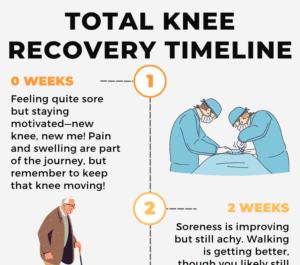If you’re considering knee replacement surgery, one of the first questions that probably comes to mind is, “How long will my new knee last?” It’s a valid concern, especially when weighing the benefits and potential challenges of surgery. Let’s break down the facts to give you a clear understanding of knee replacement longevity, the factors that influence it, and how you can ensure the best possible outcome.
The Lifespan of a Knee Replacement
10-Year Success Rate
The statistics are encouraging: over 95% of knee replacements are still functioning well 10 years after surgery. This means the majority of patients enjoy long-term pain relief, improved mobility, and enhanced quality of life during this period.
20-Year Success Rate
At the 20-year mark, about 80% of knee replacements are still going strong. While some wear and tear is expected over two decades, these figures demonstrate that knee replacements are a reliable solution for most individuals, particularly when combined with good post-surgical care and lifestyle adjustments.
Factors Affecting Longevity
1. Age and Activity Level
-
Younger Patients: Younger individuals, especially those under 60, tend to have a higher risk of needing revision surgery. This is because they’re likely to place more stress on the implant over time due to greater physical activity.
-
Activity Levels: High-impact activities like running or jumping can speed up wear and tear on the prosthetic joint. Low-impact activities such as swimming, cycling, or walking are better for maintaining joint health without overloading the implant.
2. Implant Type and Surgical Technique
Advances in implant materials and surgical techniques have improved the durability of knee replacements. Implants made of cobalt-chromium alloys, titanium, and highly cross-linked polyethylene are designed to withstand more wear and tear. However, the surgeon’s skill and precision in placing the implant are equally critical in ensuring its longevity.
3. Weight and Overall Health
Carrying extra weight increases stress on your knee joint, including a prosthetic one. Reducing body weight not only prolongs the life of your knee replacement but also improves your overall health and mobility.
How to Maximize the Life of Your Knee Replacement
1. Stick to Low-Impact Activities
While staying active is essential, opting for low-impact exercises can help reduce stress on your new knee. Activities like water aerobics, yoga, or elliptical training allow you to remain fit without accelerating wear and tear.
2. Follow Your Rehabilitation Plan
A structured rehab program after surgery is critical. Strengthening the muscles around your knee provides better support and stability, reducing the strain on your implant.
3. Monitor Your Weight
Every extra pound of body weight adds roughly four pounds of pressure on your knee joint. Maintaining a healthy weight can significantly reduce the mechanical stress on your replacement joint and improve its longevity.
4. Regular Follow-Ups
Stay in touch with your orthopedic surgeon for routine check-ups. Early detection of potential issues, such as implant loosening or wear, can prevent more extensive problems down the line.
Therapeutic Edge
When to have a knee replacement is a personal decision that depends on your pain levels, mobility challenges, and lifestyle goals. If you’re younger or highly active, it’s worth discussing with your doctor how your lifestyle might impact the lifespan of your knee replacement. In some cases, delaying surgery until the pain and disability significantly interfere with daily life can be beneficial.
On the flip side, don’t delay too long—prolonged inactivity due to knee pain can lead to muscle weakening, reduced mobility, and other health complications. By staying proactive about your health, engaging in appropriate physical activity, and following your surgeon’s advice, you can maximize the success and durability of your new knee.










